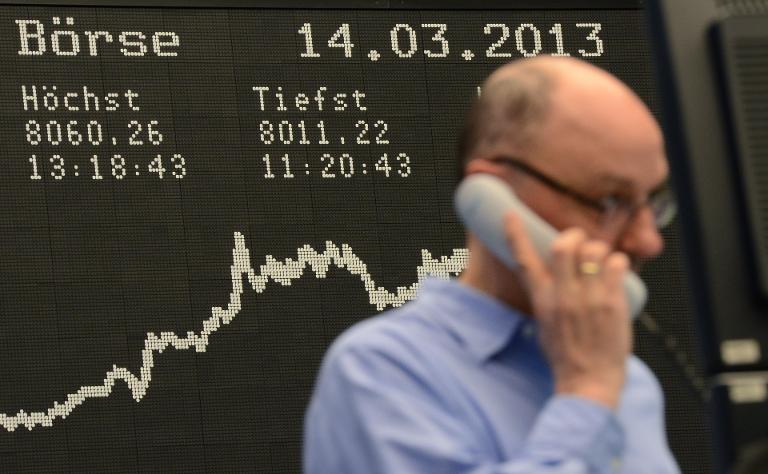
European stocks soar, Swiss stocks slump as SNB unchains franc
The Swiss franc, seen as a safe haven investment, jumped 29 percent against the European single currency after the central bank said it was discontinuing the minimum exchange rate of 1.20 francs per euro after three years.
The franc, which bought a euro for 1.2010 late on Wednesday, reached 0.8517 Thursday. That was a record high and the first time that the franc had gone beyond parity with the euro since the birth of the single currency in 1999.
It later lost steam to trade at 1.0421 francs against the euro.
With Switzerland's economy heavily dependent on exports, investors feared that a strong franc could dent earnings at Swiss companies and dumped their stocks, sending the Swiss Market Index tumbling. It ended the day down 8.7 percent to 8,400.61 points.
"I am at a loss for words," Swatch group's boss Nick Hayek told news agency ATS. "What the SNB has sparked here is a tsunami."
The Swiss watchmaking giant was among top losers on the stock market, with its shares tumbling 16.4 percent while those of the world's second largest luxury group Richemont slumped 15.5 percent.
- Euro hits 11-year low -
European stocks initially slumped on the Swiss decision, but eventually rallied.
"There was a lot of turbulence in European equity markets on Thursday after the Swiss National Bank dropped the bombshell that they will no longer maintain the Swiss franc's peg to the euro," said analyst Jasper Lawler at CMC Markets UK.
"The possibility of blowback across global markets meant equities initially collapsed when the Swiss peg gave way but soon regained their footing on the realisation the Swiss action was likely taken in anticipation of ECB bond buying."
London's benchmark FTSE 100 index ended the day up 1.73 percent at 6,498.78 points, Frankfurt's DAX 30 rose 2.20 percent to 10,032.61 points and the CAC 40 in Paris gained 2.37 percent to 4,323.20.
There are mounting expectations the European Central Bank will launch at its next policy meeting on January 22 a quantitative easing (QE) programme under which it buys large amounts of government bonds to inject funds into the economy to counter the threat of deflation.
Such a programme will lead to a weakening of the euro, and would have made it impossible for the SNB to hold down the value of the franc.
Wall Street stocks dropped Thursday following disappointing US bank earnings.
The Dow Jones Industrial Average shed 0.40 percent to stand at 17,356.69 points in midday trading.
The S&P 500 index lost 0.55 percent to 2,000.12, while the tech-rich Nasdaq Composite Index lost 0.83 percent to 4,600.86.
US bank earnings continued to disappoint, with Bank of America results dropping 11.3 percent and Citigroup profits sinking 86 percent on a hefty legal charge.
Bank of America shares fell 3.3 percent, while Citi shares dropped 2.4 percent.
Meanwhile the euro fell to an 11-year low against the dollar on Thursday, with the single currency under pressure from mounting prospects of fresh stimulus from the ECB next week.
The euro touched $1.1575, but recovered to $1.1608 in late trading, which was still down from $1.1782 on Wednesday.
The prospect of ECB buying government bonds continued to help lower their borrowing costs, with Spain placing 4.7 billion euros in medium and long-term debt at record low rates. The average yield on 10-year bonds hit 1.147 percent, down from 1.731 percent in the previous auction in December.

Legal Disclaimer:
MENAFN provides the
information “as is” without warranty of any kind. We do not accept
any responsibility or liability for the accuracy, content, images,
videos, licenses, completeness, legality, or reliability of the information
contained in this article. If you have any complaints or copyright
issues related to this article, kindly contact the provider above.


















Comments
No comment